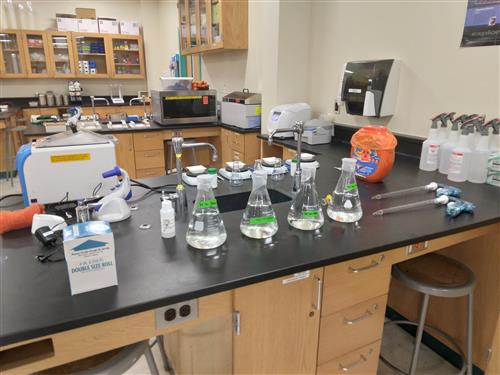- Ironwood Ridge High School
- Bioscience Internship
Manno, Theodore
Page Navigation
- About the Teacher
- Contact Info
- Bioscience I
- Bioscience II
- Bioscience Internship
- Biology (General)
- Nighthawk's Nest Biotechnology News
- Laboratory Gallery
- Classroom Gallery
- Nighthawk Chess Collective
- Nighthawk Origami & Tangram
- The Nighthawk Phylogeny Project
- Nighthawk Proteomics Institute
- Biostatistics @ The Nighthawk's Nest
- Ironwood Writer's Workshop
- The Ridgewood Methods
- Nighthawk Biotechnology Class Mascots
- Nighthawk Biotechnology In Action--Video Montage
-
WELCOME TO NIGHTHAWK BIOTECHNOLOGY: NEXT GENERATION
WE ARE THE FUTURE, AND THE FUTURE IS NOW
BIOSCIENCE-INTERNSHIP
Bioscience-Internship is a skills-based laboratory course that encourages work ethic and practical skills (Prerequisites: Completion of 9th grade Biology and Bioscience I & II). Interns will assist with lab setup for the Bioscience program, conduct independent research, and further their proficiency in laboratory skills en route to studying science at the post-secondary level. Students will also develop as peer leaders and explore career opportunities in the biotechnology and pharmaceutical industries, with some participating in science-related activities off campus as part of the internship. Nighthawk Biotechnology: Next Generation operates as a laboratory in academia under the auspices of a primary investigator, with interns essentially taking on the role of graduate assistants.
Our curriculum is based upon the Arizona Department of Education Science Standards and the Academic Standards of the Amphitheater Public School District. The class is designed to help students develop an interest in science and learning, to become scientifically literate citizens, and to operate in contemporary society as effective thinkers and problem solvers. Accordingly, Amphi’s “Picture of a Graduate” mission will drive classroom expectations and goals. Thus, students will be expected to not only learn academic content, but also to demonstrate proper citizenship, communicate consistently and clearly, think creatively and critically, care for themselves and one another, and collaborate to solve problems in the context of the fields of biology and science.

The lab facilities available at Nighthawk Biotechnology in "The Room" (A232) are top notch, including cell culturing equipment, multiple centrifuges, incubators, and autoclaves of various sizes, several temperatures for refrigeration and freezing, spacious lab stations, an electrophoresis gel viewer with software, a thermal cycler, a MilliQ distilled water fountain, electric pipet fillers, Biological Safety Cabinets, and a generous stock of restriction enzymes, bacterial cultures, plasmids, RNA primers, polyermase, buffers, and other specialized chemicals. Our classroom features Virtual Reality headsets, large triplicate HDTV screens, and a high-quality audio system. Interns should enter the class with proficiency and the ability to assist other students in the following procedures:
- Pipetting
- Centrifugation
- Macromolecule Identification
- Nucleic Acid Extraction
- Cheesemaking and Juice making with enzymes
- Cell Identification using Gram Staining
- Microscopy
- Yogurt making using probiotic fermentation
- Spectroscopy
- Cell culturing using agar and differential media
- Restriction Enzyme Digestion
- Gel Electrophoresis
- Polymerase Chain Reaction (PCR)
- Forensic Identification of RFLPs (Restriction Fragment Length Polymorphisms)
- Bacterial Transformations with pGLO and pVIB plasmid
- BLAST and DNA code alignment
- Phylogenomic Analysis and Taxonomy creation
- Modelling Population Dynamics
- Identifying GMOs using genetics
- Bioremediation using transformed bacteria
- DNA Sequencing (Sanger, through University of Arizona Genetics Core)
- Gene Editing with CRISPR
- Specialized cell culturing
- Advanced bacterial transformations
- Buffer and solution preparation
- BLAST and MAFFT DNA alignment
- Use of NCBI and DNA Subway
- Phylogenomics
- Phylogeny creation using FASTA data
- ab1. and seq. nucleic acid sequence files
- DNA Spectrograms with Four Peaks Software
- Use of Gel Viewer Software
- Advanced DNA Extraction methods
- Protein Chromatography and Separation
- SDS-PAGE
- Statistical Analysis (t, R-squared, chi-squared, boxplots, P-values, distributions)
- Full-length scientific paper composition and simulated peer-review
Interns examine career options in the sciences and form ideas for the Independent Projects they will conduct in the future. Students are also encouraged to involve themselves in local science initiatives, such as SARSEF (Southern Arizona Science Fair), HOSA (Health Occupations Club at IRHS), Univ. Arizona KEYS (intensive summer program), and Univ. Arizona STAR Labs (intensive program involving afternoons during the school year).
At Nighthawk Biotechnology: Next Generation, we involve students in the exciting field of biotechnology and build young men and women with the character and work ethic necessary for research and allied-health opportunities of the future. Come join us! The future is now.

